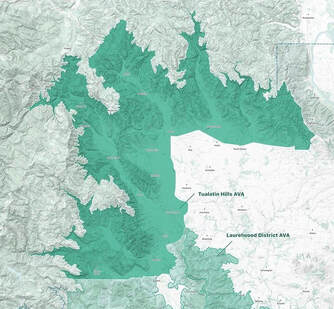|
The Tualatin Hills AVA highlights a unique grape-growing region characterized by its northern most location within the Willamette Valley, due west of Portland and just east from the Oregon Coast Range. At an elevation range between 200 and 1,000 feet, the area benefits from the rainshadow of the Coast Range with a slightly lower rainfall, cooler springs and warmer falls. It is sheltered to the west by some of the highest peaks of the coastal mountains and shielded to the south by the large mass of the Chehalem Mountains. The region has long been an active agriculture area, and is defined by the watershed of the Tualatin River, and the largest concentration of Laurelwood soils in Oregon.
|
|
Terroir is a French term used to describe wines. The word translates as, taste of the place, and means that location is a definitive factor of the characteristics found in certain wines, especially if the wine is Pinot Noir or Riesling which are “transparent” grapes. Terroir is a combination of the total attributes of the vineyard: the particular grape, the geology/soil where 13 of the essential 16 nutrients come from, the climate, the slope, elevation and aspect, and the soil’s water-holding capacities.
David Hill Vineyard has a special terroir. One of the reasons for this is the geology and the soil. The geology is a 15 million year-old bedrock that is comprised of volcanic rock, and basalt. The volcano where it came from was 350 miles away (where Oregon, Washington and Idaho come together), and the lava flowed to this place, where it solidified. Through the millions of years since the rock was formed, the rock has weathered to an old soil that is classified as the Laurelwood Soil Series. It has been modified by Mother Nature over the past two million years by a large influx of windblown silt called loess. The weathered soil from the basalt has combined with the loess to form an old soil. Formed in the soil are iron concretions geologists call pisolites – little rounded balls of iron oxides and hydroxides that are sand and gravel size. These pisolites give the wines a special flavor. There are three main soils in the Willamette Valley AVA, in which wine grapes are mainly grown: volcanic soils marine sediment soils windblown silt on volcanic soils The volcanic soils are mainly Jory Series and the Nekia (shallow Jory) Series. The marine sediment soils are primarily: Willakenzie Wellsdale Melbourne Soil Series The windblown silt on volcanic soils are mainly the Laurelwood Series. Pisolites are not found in marine sediment soils, but are found in the other two. "Taste the wines here and you can taste the terroir of all of the above five factors, but it is the Laurelwood soil with its Pisolites that make David Hill wines so special. – Scott Burns, Professor of Geology, Portland State University |
